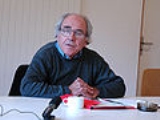
sociologist, philosopher, cultural theorist
, political commentator, and photographer. His work is frequently associated with postmodernism
and post-structuralism
.
Baudrillard was born in Reims
, northeastern France, on July 27, 1929. He told interviewers that his grandparents were peasants and his parents were civil servants. During his high school studies at the Reims Lycée, he came into contact with pataphysics (via the philosophy professor Emmanuel Peillet), which is said to be crucial for understanding Baudrillard's later thought.
The real is not only what can be reproduced, but that which is already reproduced, the hyper-real. (p. 146)
L'autre par lui-même (Paris: Éditions Galilée, 1987); trans. Bernard and Caroline Schutze, New York:Semiotext(e)
![]()
The need to speak, even if one has nothing to say, becomes more pressing when one has nothing to say, just as the will to live becomes more urgent when life has lost its meaning. (p. 30)
![]()
Picturing others and everything which brings you closer to them is futile from the instant that ‘communication’ can make their presence immediate. (p. 42)
![]()
The close-up of a face is as obscene as a sexual organ seen from up close. It is a sexual organ. The promiscuity of the detail, the zoom-in, takes on a sexual value. (p. 43)
![]()
Challenge, and not desire, lies at the heart of seduction. (p. 57)
![]()
Seduction is the world’s elementary dynamic… All this has changed significantly for us, at least in appearance. For what has happened to good and evil? Seduction hurls them against one another, and unites them beyond meaning, in a paroxysm [sudden outbreak of emotion] of intensity and charm. (p. 59)
![]()
Distinctive signs, full signs, never seduce us. (p. 59)
![]()
THERE IS NEVER ANYTHING TO PRO-DUCE. In spite of all its materialist efforts, production remains a utopia. We can wear ourselves out in materializing things, in rendering them visible, but we will never cancel the secret. (p. 65)
![]()
And so one can imagine that in amorous seduction the other is the locus of your secret — the other unknowingly holds that which you will never have the chance to know. (p. 65)
![]()
Take provocation, for instance, which is the opposite and the caricature of seduction. It says: "I know that you want to be seduced, and I will seduce you." Nothing could be worse than betraying this secret rule. Nothing could be less seductive than a provocative smile or inciteful behaviour, since both presuppose that one cannot be seduced naturally and that one needs to be blackmailed into it, or through a declaration of intent: "Let me seduce you" (p. 67)
![]()

